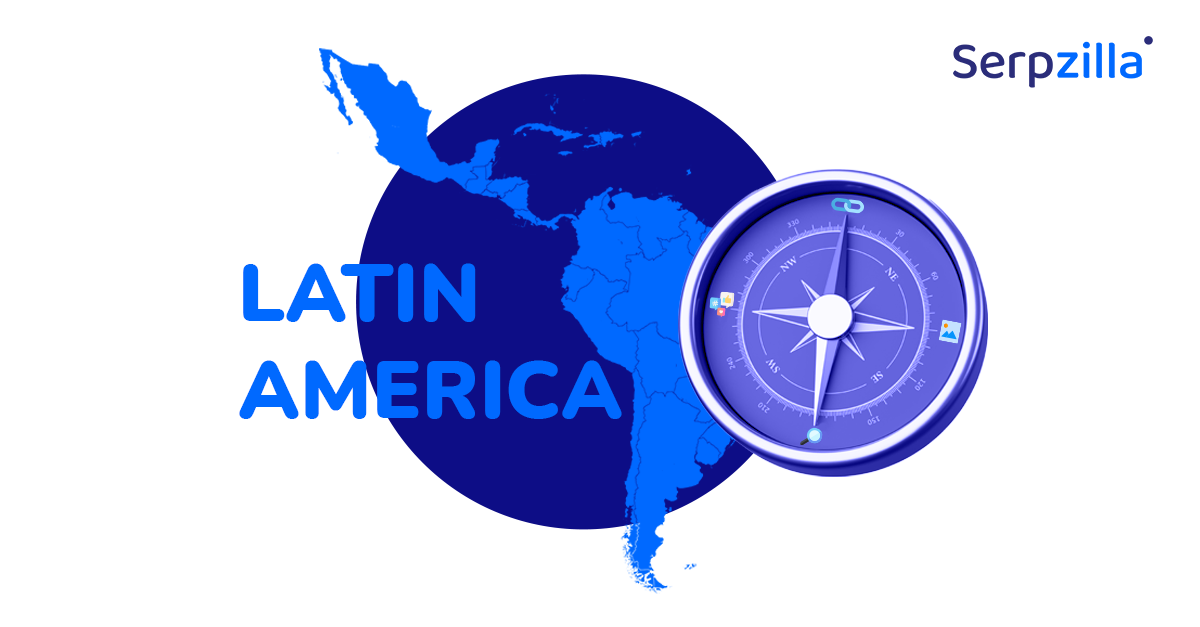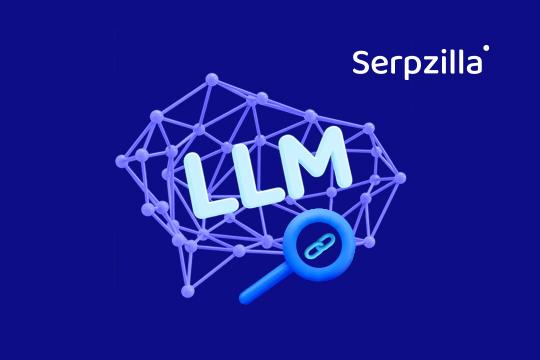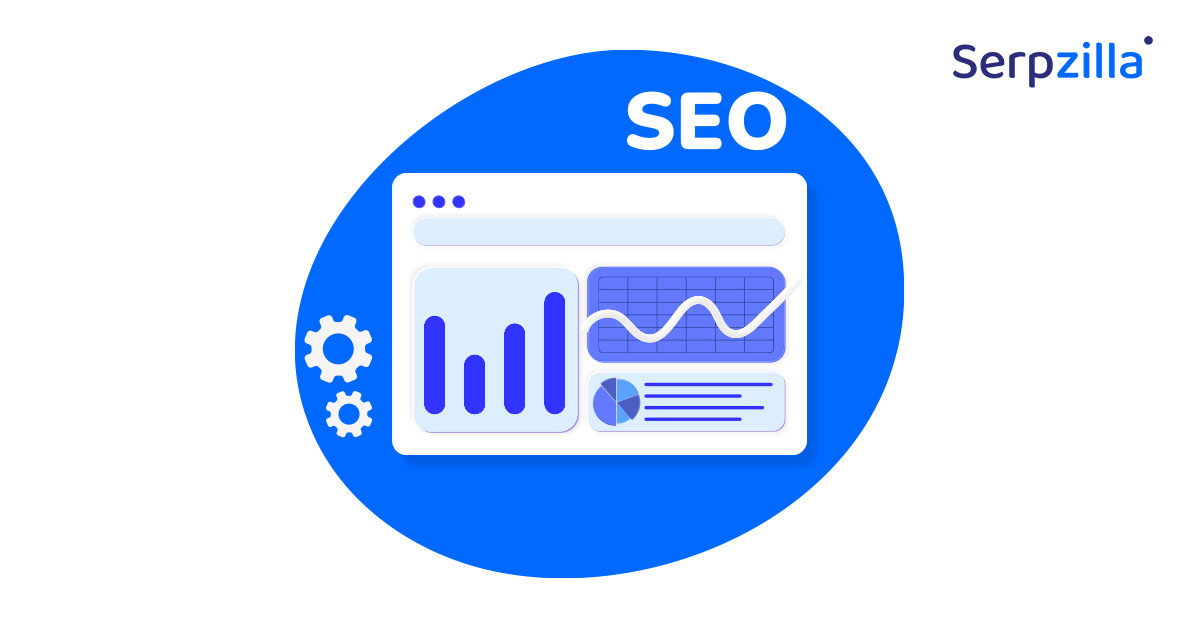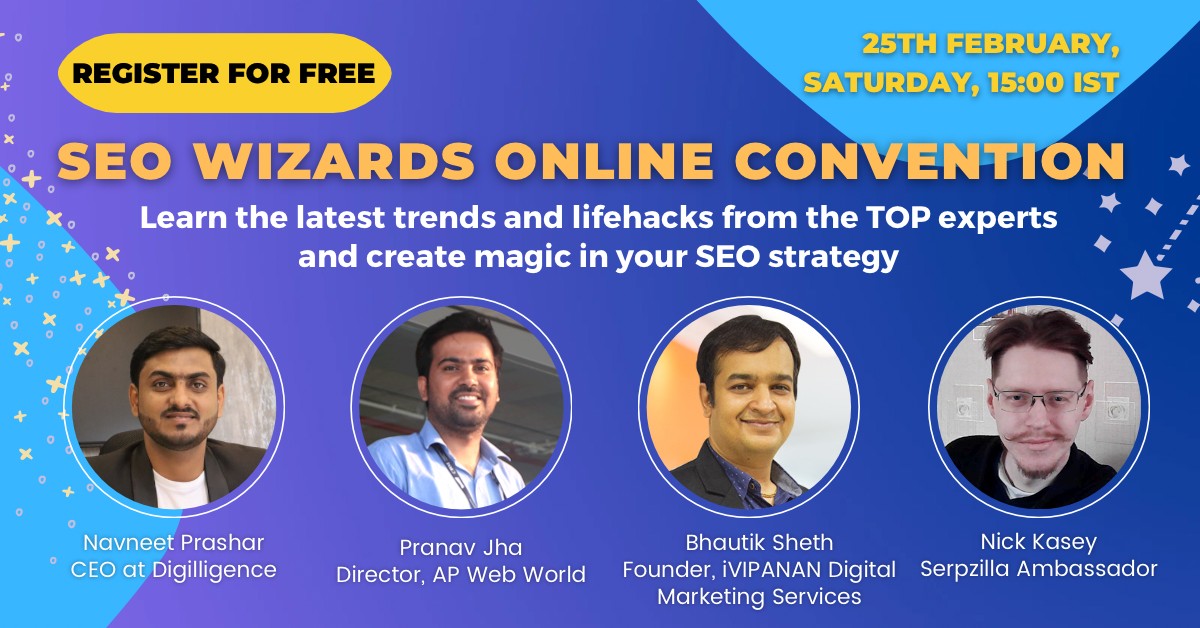The world of SEO is changing fast. And at the heart of this change is Artificial Intelligence (AI).
You’ve probably noticed it already. AI tools writing content, Google rolling out AI-driven updates, and new search experiences popping up left and right, sudden changes in SERPs, algorithms etc. What once took hours of manual SEO work can now be done in minutes with the help of smart AI tools.
But here’s the big question:
What does all of this mean for the future of SEO?
In simple words, AI is going to shake things up. A lot.
The next 5 years won’t just bring small tweaks. We’re talking about a complete shift in how content is created, ranked, and consumed.
After reading this article, you will know:
- How AI is already changing SEO
- What trends do you need to watch
- And most importantly, how to prepare
Whether you’re just starting in SEO or already deep in the game, this is going to be a complete guide to help you understand what’s happening and what’s coming.
AI in Search Engine Optimization
To understand where SEO is headed, we need to look at where it’s been. Especially how AI has slowly become part of the search engine’s brain without us even noticing.
A few years ago, Google just matched words. If you searched “best laptop for students,” it would look for pages that had those exact words in titles or headings.
But today, It’s way smarter. Why? Because of AI-based algorithms. Google can now understand what you mean, not just what you type.
Let’s see how some of the recent SEO updates shaped modern SEO with the influence of Artificial Intelligence.
RankBrain (2015): It was Google’s first big AI step. It helped the algorithms understand intent, not just keywords. For example, if you search “How to make coffee without a machine”, RankBrain connects that to content about French press or manual brewing, even if those words aren’t in the query.
BERT (2019): It understood context. It helped Google read full sentences like a human using artificial intelligence, of course.
SGE – Search Generative Experience (2023+): And it was the next level update. AI-powered answers right in search results, providing full summaries, product suggestions, and more, without needing to click a link.
From these few noticeable changes, we can understand how search Is getting smarter. Faster than we could even imagine. All these updates mean one thing: Search engines are no longer matching words against queries. They’re understanding people.
And that entirely changes how we do SEO.
If your content doesn’t match real human intent or adds actual value, it won’t rank, no matter how well it’s optimized on the surface.
What is SGE – Search Generative Experience?
Remember when Google used to just show you 10 blue links and let you pick the best one? Yeah… those days are fading fast. Now, search engines want to give you the answer right there above-the-fold, without you ever clicking a website.
SGE is basically Google’s AI-powered search experience. It uses generative AI (like ChatGPT-style responses) to give instant summaries, product comparisons, or direct answers right in the results.No need to visit a blog, read through a full guide to find a one line answer. You don’t even need to scroll.
And other platforms are doing the same:
- Bing with Copilot
- You.com with AI-driven answers
- Perplexity AI giving citation-backed answers
This is a huge shift. When search engines are becoming answer engines, it is impacting websites badly. Clicks going down, traffic dropping, even ranking #1 might not matter as much anymore.
Even if your content is the source, users might never visit your site. They’ll just read the AI summary that used your info, and move on.
This was already happening with featured snippets. SGE takes it one step further.
Now, if we take a look from an SEO’s perspective, AI has made a powerful entry here too.
AI-Generated Content in SEO
Let’s be honest, AI is writing a lot of content these days.
From blogs and product descriptions to emails and landing pages. Tools like ChatGPT, Jasper, Copy.ai, Perplexity, and Claude are churning out words faster than any human team could.
Marketers and SEOs love it. Why wouldn’t they?
- It’s fast
- It’s cheap
- It can scale
You can write 10 blog posts in a day instead of 1 per week.
Sounds like a dream, right? Well… not exactly.
Downsides of AI content you can’t ignore
The problem is that Most AI content is average at best.
It often lacks depth, originality, experience, and real-world insights. It lacks emotion and sounds robotic, even when it’s grammatically perfect. And Google knows it.
In fact, with the Helpful Content Update and newer changes, Google is actively looking to identify AI-written fluff and demote low-value pages while rewarding content written with real human experience, expertise, and insight.
So if you’re relying ‘only on AI’ to write your blogs, product pages, or website copy, you’re taking a big risk (as of 2025).
Here is Google’s Official Stance on AI Content
Google doesn’t ban AI content. But they’ve made one thing clear:
Helpful, original, people-first content will always win.
Whether it’s written by a human or machine doesn’t matter; what matters is value.
So, if your AI-written content reads like it was slapped together in 2 minutes, don’t expect it to rank. Here’s the smart way to use AI for content:
1/ Use AI tools for research, outlines, and rough drafts
2/ Then bring in a human to add depth, insights, examples, and edits
3/ Focus on real-world value, not just SEO tricks
Treat AI as an assistant to your writer, not your writer.
The best-ranking content in the next 5 years will be the kind that feels like a human, shares real opinions, stories, & data, and solves real problems better than anyone else.
Predictive Personalization in Search Results
Search is no longer “one-size-fits-all.” Thanks to AI, Google and other platforms are getting better at predicting what you want, even before you finish typing. Isn’t it scary? But it’s already happening.
Using AI, search engines can now learn what you like, track your past searches, understand your location, your device, and even your behavior patterns to predict the most suitable results for ‘you’
So, if two people search best restaurants, Google Maps shows different options to both of them standing on the same spot. Even YouTube recommends completely unique content feeds based on watch history. Amazon personalizes search results based on past purchases
That’s predictive and personalized search in action, and it will get better only in the future.
How can SEOs optimize for personalized search results?
In 2025, it’s not enough to rank for a keyword. You have to match the user’s intent, context, and journey. Sounds difficult? Here’s how to do that:
1. Target Intent Clusters, Not Just Keywords
Create content for every stage of the buyer’s journey:
• Awareness (what is…)
• Consideration (best tools for…)
• Decision (X vs Y, reviews, pros and cons)
2. Optimize for Local + Mobile
Local searches and mobile experience matter more than ever. Include local landmarks, location keywords, and make sure your site is mobile-first.
3. Build Trust and Consistency
AI picks up on that signal if a user visits your site, engages, and returns. So, build a strong user experience and connection with the reader, and make people come back and dwell longer on your website. It helps AI trust you and pull your content as a reliable source.
The better you understand your audience, the better your content will perform in the AI-powered SERPs.
Best AI SEO Tools (For Automating the Process)
Honestly, SEO is a lot of work. From keyword research and content briefs to internal linking and metadata… it’s a never-ending to-do list. And that’s why I recommend using AI tools (wherever possible) because they’re super helpful, and time savers.
Here are some popular AI-powered tools you can use in SEO in 2025:
Surfer SEO – Helps you optimize content based on real-time SERP data
Frase.io – Creates detailed content briefs and outlines in minutes
Clearscope – Suggests keyword variations and semantic terms to boost topical depth
ChatGPT / Claude – Assists with idea generation, outlines, and even meta descriptions, alt texts.
These tools are saving us hours every week, and in some cases, replacing entire workflows.
But there are things you shouldn’t hand over to a robot. Like, content strategy, adding a human touch and storytelling, adding real-world insights, case studies, experiences, opinions, etc.
Let AI do the heavy lifting, but make sure you’re still driving the car.
How to use AI for linkbuilding?
Link building has always been one of the hardest (and most valuable) parts of SEO. But now, AI is stepping in here too. Outreach, prospecting, personalization – things that used to take hours, can now be done in minutes using the right tools and prompts.
Here’s how I am using AI for link-building tasks so far.
1/ Prospecting (at scale): AI tools can scrape websites, find emails, filter for relevance, and build outreach lists
2/ Personalized email outreach: Training GPT/Claude my styles of writing winning email templates and then just providing it some context each time and it writes the perfect “custom” emails in few seconds. But still, it is always best to edit the draft and add a human touch.
3/ Follow-ups and automation: AI can schedule and send follow-up sequences based on behavior, it can help you negotiate, convince, and close if you don’t have strong communication skills.
You can also try advanced link-building tools like Serpzilla for automated link building services and save yourself time, and efforts.
Serpzilla already uses AI under the hood to make its automation features more sophisticated and to reduce error risks.
For instance, you can greatly cut down the time spent searching for potential referring domains. Serpzilla offers a very finely tuned search and filter system that can help you create a pool of link building prospects which would feature perfect matches for your tasks.
You can select sites using a variety of criteria, such as Domain Authority, geolocation and language, niche, type and others. You can filter them by their offers: do they rent out links? Do they offer permanent link placements? Existing content or new? Site content or guest blogging?
One of the AI-powered features Serpzilla offers to enhance your link-building process is Smart Topic. It analyzes a URL or the text entered in the field to determine its topic. Based on this, the AI instantly suggests relevant placements within Serpzilla’s platform, making it easier to choose the most suitable and effective placements for your SEO strategy.
All of this helps you to create the perfect backlink profile and spend only a fraction of time you would if you did it manually.
How to prepare your SEO Strategy for 2030?
So far, we’ve covered a lot. AI tools, SGE, AI content, predictive search, and more. But here’s the real question: How do you actually prepare your SEO strategy for the next 5 years, when AI will be 10x stronger?
As someone in SEO for last 6 years, the best I can do is identify patterns and predict how we can build a future-proof SEO strategy. Let me break it down into clear, no-fluff actions.
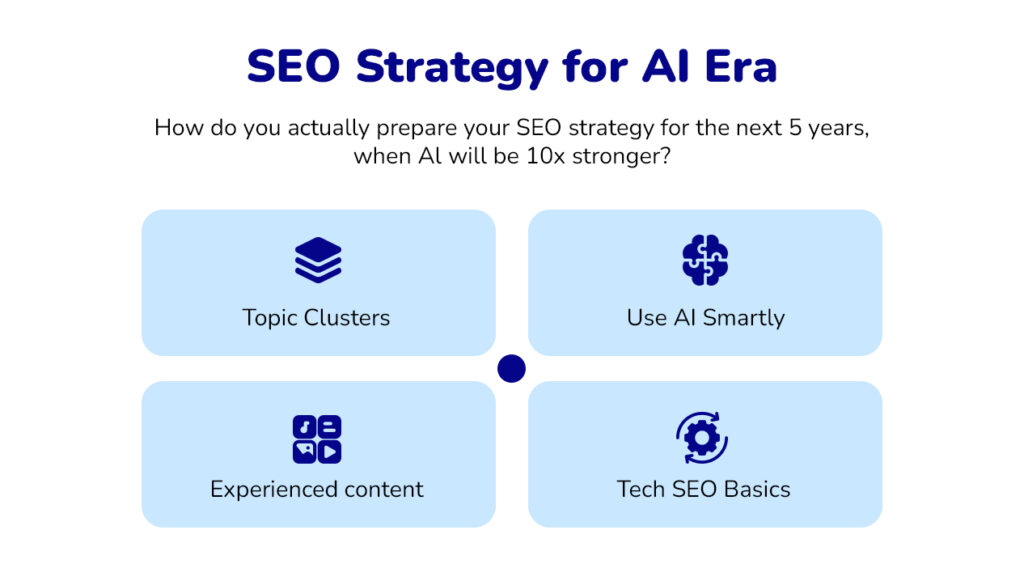
1. Stop Thinking Only in Keywords – Think in Topics + Intent
Keywords still matter. But they’re just the starting point. To win in AI-powered search results, you will need to:
- Group content around topics, not just single keywords
- Cover every angle: what, why, how, pros/cons, comparisons, questions
- And build topical authority, not just isolated blog posts
This way, your site becomes a trusted resource, the kind of one AI wants to quote.
2. Start using AI tools
Mix AI into your workflow, but don’t hand over the wheel completely. Use AI tools to:
- Speed up content briefs, and article outlines
- Suggest internal links and metadata
- Generate drafts you can refine
- Find gaps in SERPs,
But YOU should still be the strategist. And don’t let AI write for your brand without human input.
3. Write More Experience-Based Content
Right now, Google is craving real-world insight more than ever before.
Your content needs stories from your own projects, case studies with actual results, screenshots, photos, behind-the-scenes moments, personal takes, and strong opinions.
Make it feel like no AI could’ve written it. That’s how you will stand out.
4. Stick to the basics of Tech SEO
Google’s ability to crawl, index, and assess your site is getting much powerful now. Don’t ignore these basics:
- Fast loading speed
- Mobile-first design
- Schema markup
- Strong internal linking
- Clean URL structure
- Structured content (H1s, subheadings, bullet points)
A solid technical foundation makes it easier for AI systems to understand and rank your content.
5. Train Your Team for the Future
Whether you’re a solo freelancer or running a team, stay ahead by learning how to prompt AI tools effectively. Study new SERP layouts and how AI answers work, find patterns. Keep up closely with future algorithm updates, and keep testing for what works and adapt fast.
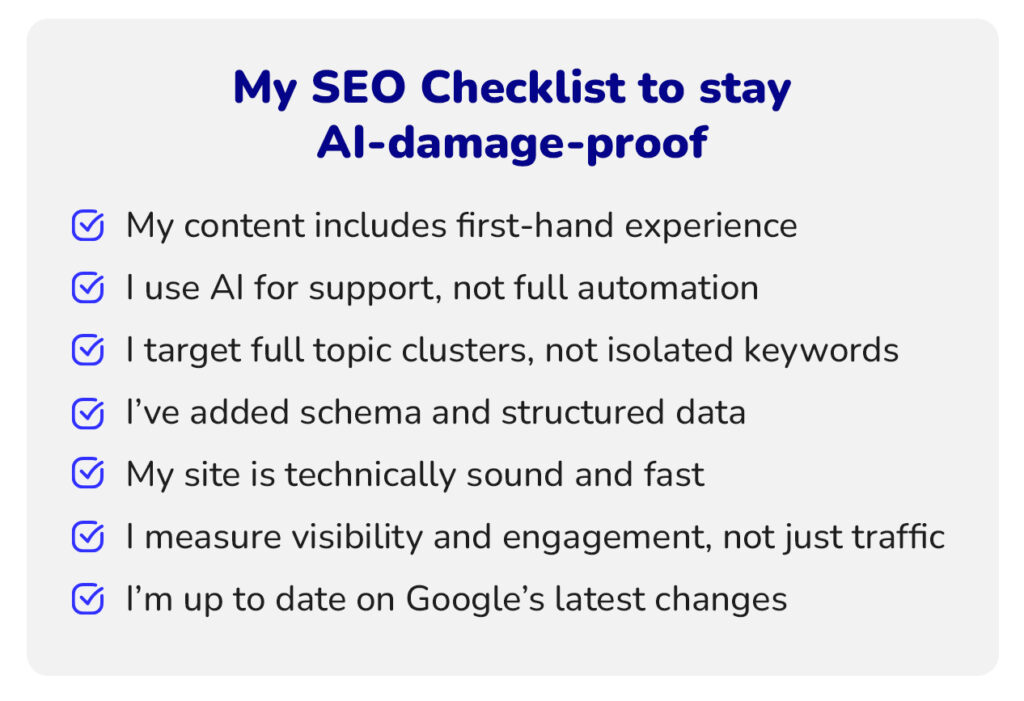
Final Thoughts
The SEO landscape is changing faster than ever before.
AI is writing content.
AI is rewriting search engines.
AI is even deciding what not to show users.
It can feel overwhelming, even for experienced SEOs. But this isn’t the end of SEO. It’s the evolution of it. The people who win in the next 5 years won’t be those who panic…They’ll be the ones who adapt, experiment, and stay human in how they create, connect, and rank.
Let AI take care of the boring, repeatable stuff.
Let it help you move faster. Smarter.
But never forget that People trust People, not robots. Thought leadership, originality, and real-world experience will always be on top.
Whether you’re building a business, running client campaigns, or scaling your own niche sites, keep your strategy focused on value, authenticity, and clarity.
SEO isn’t dying. It’s just growing up.
FAQs
Will AI replace SEO jobs?
So far I can not find any AI tool that can completely handle SEO tasks without human intervention, and better than humans. So the answer is No, but AI will change the jobs. SEO professionals who learn to use AI tools effectively will stay ahead, while those who ignore it may fall behind.
How does Google handle AI-generated content?
Google doesn’t ban AI content, but it prioritizes helpful, original, experience-driven content. If your AI content lacks value, it won’t rank well.
What is SGE and how does it affect SEO?
SGE (Search Generative Experience) is Google’s AI-powered search update that provides direct answers in the SERPs. This reduces clicks to websites and pushes SEOs to focus more on visibility, summaries, and trust signals.
What are the best AI tools for SEO in 2025?
Top tools include Surfer SEO, Frase.io, Clearscope, Jasper, and ChatGPT. These help with content briefs, optimization, keyword research, and faster workflows.
Can you rank content made by AI?
Yes, but only if it’s helpful, accurate, and aligned with Google’s EEAT guidelines. AI content alone won’t usually rank unless it’s refined and value-packed.



